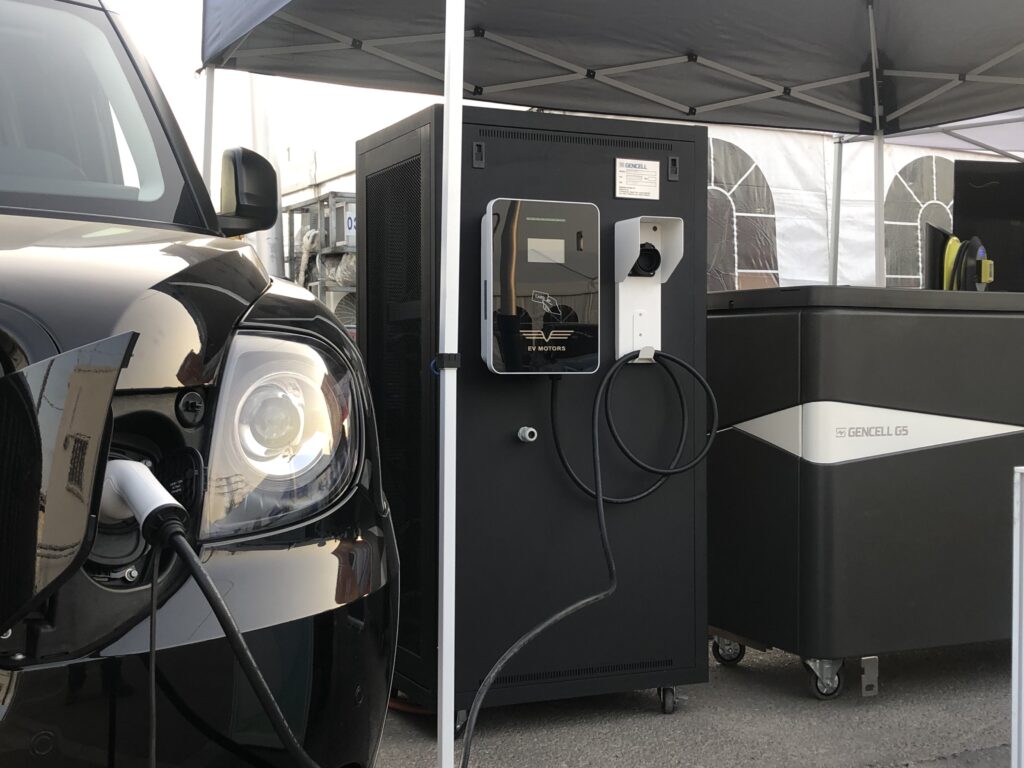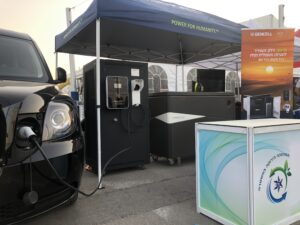
Close-up of GenCell and E.V. Motors' electric vehicle charger.
Hydrogen was endorsed as the fuel of the future by countries and delegates attending COP26 in Glasgow during November 2021.
Carbon emissions could be cut by 10% from present levels by 2050 through a switch to green hydrogen and its derivatives, the International Renewable Energy Agency (IRENA) told delegates.
“We are on the cusp of an energy revolution that could see hydrogen play a key role in the way we bring fully decarbonized energy to our homes, offices, and factories,” wrote Marco Alverà, CEO of Italian energy infrastructure operator SNAM in a Fortune article which commented on consensus at COP26 that greater use of hydrogen could dramatically speed up energy transition away from fossil fuels.
The motor industry has been working with fuel cells for some time, and there are thousands of hydrogen-powered electric vehicles on the road. One of the biggest challenges facing OEMs is the availability of hydrogen to top up fuel cells. Israeli company GenCell believes that green hydrogen should be converted to ammonia for ease of transport and storage.
Automotive Industries (AI) asked Rami Reshef, CEO of GenCell, to tell us more about the company.

Reshef: Amidst the backdrop of an increasingly urgent climate crisis, GenCell was founded in 2011 to facilitate the transition away from harmful fossil fuels by leveraging the power of hydrogen to produce clean energy.
GenCell Energy is a leading manufacturer of alkaline-based hydrogen fuel cells, and its solutions offer ultra-reliable, highly resilient and emission-free backup and off-grid power for humanity. Its efficient alkaline fuel cell technology is generating long-duration and minimal maintenance backup power for a range of sectors worldwide, including telecoms, utilities, security, healthcare and other mission-critical applications, and most recently also supporting autonomous hybrid EV charging stations.
GenCell’s mission is to leverage hydrogen as a viable and accessible source of renewable energy by mitigating the logistical and cost barriers to its adoption. To this end, GenCell has developed a revolutionary process of extracting hydrogen-on-demand from ammonia.
AI: Why ammonia?
Reshef: Liquid ammonia has high hydrogen density at room temperature and pressure, which makes it an optimal hydrogen carrier. Add to this the vast infrastructure that already exists for storing and transporting ammonia, means that is much easier and more affordable to transport than hydrogen. As such, storing hydrogen as ammonia offers an efficient means for seasonal storage of surplus renewable energy produced from solar or wind, eliminating wasteful curtailment of renewable energy.
Another obstacle to the use of fuel cells has been their high production costs, but GenCell’s patented innovations have dramatically reduced the CAPEX and OPEX of its fuel cells, making them more affordable for mainstream use. By combining its economical fuel cells with ammonia storage, GenCell will help to commercialise the use of hydrogen fuel cells across a wide variety of industries, creating an ultra-reliable, zero-emissions power source at a running cost of 30-50% less than diesel fuel.
Going forward, GenCell aims to achieve total green solutions by producing green ammonia on-site from renewable energy to provide its fuel cells with green hydrogen, thus enabling an emission-free energy economy from well to wheel.
AI: What opportunities does GenCell see for hydrogen in the automotive sector?
As the ultimate solution for emission-free and long-duration energy storage, hydrogen will certainly play a key role in the future of the automotive sector.
Reshef: While batteries are appropriate for small and lightweight passenger vehicles with low power requirements, they are not viable for heavy and high-volume vehicles such as lorries, buses and trains. Producing sufficient energy for large and energy-intensive vehicles via batteries requires heavy b

atteries that are both expensive to produce and difficult to transport. In these use cases, hydrogen fuel cells offer a more economical and more reliable power solution, comprising onboard fuel cell generators, ammonia-to-power fueling stations and hybrid autonomous EV charging solutions that integrate fuel cells.
AI: Please tell us about your partnership with E.V. Motors.
As the number of electric vehicles increases, the demand for a wide network of distributed EV charging stations will grow exponentially. On the one hand, forecasts indicate that grid power will not be sufficient to power the estimated quantity of EVs that will reach the roads, and on the other, many destin
ations to which EVs will need to travel will be beyond the power grid. In both of these scenarios, autonomous off-grid EV charging stations powered by hydrogen and ammonia will be a key solution.”
GenCell is collaborating with EV Motors to integrate its alkaline fuel cells into E.V. Motors’ electric vehicle charging technologies to enable autonomous off-grid hybrid electric vehicle charging stations that will eliminate the need for fossil fuel backup generators. This partnership will therefore contribute to the worldwide development of the charging infrastructure required to meet the global EV market demand.
Initially, the project will involve the deployment of several demonstration sites in Israel in early 2022 which are expected to attract interest from e-mobility companies worldwide. Following the success of the initial project in Israel, the two companies will consider expanding the cooperation to similar projects in China and other territories via EV Motors’ existing partner network including Sun Surplus Energy and Co Ltd.









More Stories
Acoustic sensor systems and Fraunhofer measurement technology for in practical testing ͏
OSI Systems Receives $10 Million Order for Cargo and Vehicle Inspection Systems
Mitsubishi Electric Automotive America Launches Guardian Generation 3 Trial with Seeing Machines in North America